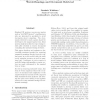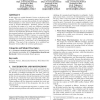126 search results - page 2 / 26 » From Frequency to Meaning: Vector Space Models of Semantics |
NAACL
2010
13 years 3 months ago
2010
Current vector-space models of lexical semantics create a single "prototype" vector to represent the meaning of a word. However, due to lexical ambiguity, encoding word ...
CORR
2010
Springer
13 years 5 months ago
2010
Springer
We propose a mathematical framework for a unification of the distributional theory of meaning in terms of vector space models, and a compositional theory for grammatical types, fo...
ACL
2003
13 years 6 months ago
2003
Standard IR systems can process queries such as “web NOT internet”, enabling users who are interested in arachnids to avoid documents about computing. The documents retrieved ...
IJCAI
2007
13 years 6 months ago
2007
Computing semantic relatedness of natural language texts requires access to vast amounts of common-sense and domain-specific world knowledge. We propose Explicit Semantic Analysi...
IIR
2010
13 years 6 months ago
2010
In this paper we exploit Semantic Vectors to develop an IR system. The idea is to use semantic spaces built on terms and documents to overcome the problem of word ambiguity. Word ...


